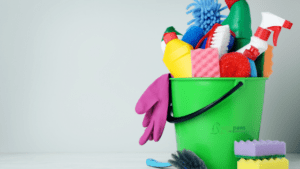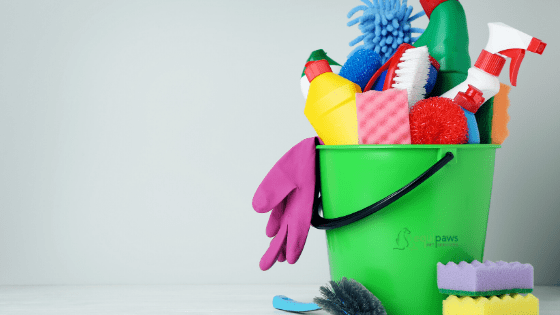
It’s important to keep your home clean and disinfected in order to protect yourselves and your pets. According to the Centers for Disease Control, “community members can practice routine cleaning of frequently touched surfaces (for example: tables, doorknobs, light switches, handles, desks, toilets, faucets, sinks) with household cleaners and EPA-registered disinfectants that are appropriate for the surface, following label instructions, and more. Some of us may become infected with COVID-19. These are the general recommendations for cleaning and disinfection of your home should you suspect you’re infected.
Cleaning and Disinfection of Households with People Isolated in Home Care (e.g. Suspected/Confirmed to have COVID-19)
Wear disposable gloves when cleaning and disinfecting surfaces. Gloves should be discarded after each cleaning. If reusable gloves are used, those gloves should be dedicated for cleaning and disinfection of surfaces for COVID-19 and should not be used for other purposes. Consult the manufacturer’s instructions for cleaning and disinfection products used. Clean hands immediately after gloves are removed.
If surfaces are dirty, they should be cleaned using a detergent or soap and water prior to disinfection.
For disinfection, diluted household bleach solutions, alcohol solutions with at least 70% alcohol, and most common EPA-registered household disinfectants should be effective.
Diluted household bleach solutions can be used if appropriate for the surface. Follow manufacturer’s instructions for application and proper ventilation. Check to ensure the product is not past its expiration date. Never mix household bleach with ammonia or any other cleanser. Unexpired household bleach will be effective against coronaviruses when properly diluted.
Prepare a bleach solution by mixing:
-5 tablespoons (1/3rd cup) bleach per gallon of water or
-4 teaspoons bleach per quart of water
How long will my diluted disinfecting bleach solution last?
We are all wondering how often we have to disinfect, and, just as importantly, how long our diluted bleach solutions last. Bleach does not have an infinite shelf life, and neither does its diluted solution. This is what Clorox.com has to say in response to a question from a user:
“Disinfecting Bleach Solution (½ cup Clorox® Regular Bleach2 added to 1 gallon water) The disinfecting solution has very specific instructions for mixing and use because Clorox® Regular Bleach2 is registered with the EPA as a disinfectant, with efficacy assured by following label instructions. Your mom’s hospital was correct to ensure its effectiveness (critical in a hospital environment) by mixing a fresh solution daily, but I can also understand that you don’t want to make it up every day if you don’t have to. To simplify things for you, you could make a smaller amount (2 tablespoons diluted in 4 cups water) that you use up over several days for general countertop cleaning. However, when you are cleaning up after things that are highly likely to spread bacteria (like raw meat), you would want to use a freshly mixed solution. You could also try Clorox® Clean-Up®. It’s really convenient for home use, with a specially designed sprayer mechanism that’s compatible with bleach and won’t corrode.”
Products with EPA-approved emerging viral pathogens claims are expected to be effective against COVID-19 based on data for harder to kill viruses. Follow the manufacturer’s instructions for all cleaning and disinfection products (e.g., concentration, application method and contact time, etc.).”
Read more on the CDC’s website.

A founding member of the Equipaws family, Frankie can mostly be found working behind the scenes, helping co-create online branding, managing several social media accounts, designing brand collateral, writing copy, and managing events. She also fills in for pet sitters and dog walkers when needed in Palmetto Bay, Pinecrest, and South Miami. Her own small pack consists of Boots the Shih Tzu mix and Nutmeg the Chiweenie.

